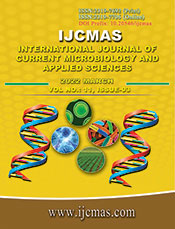


 National Academy of Agricultural Sciences (NAAS)
National Academy of Agricultural Sciences (NAAS)

|
PRINT ISSN : 2319-7692
Online ISSN : 2319-7706 Issues : 12 per year Publisher : Excellent Publishers Email : editorijcmas@gmail.com / submit@ijcmas.com Editor-in-chief: Dr.M.Prakash Index Copernicus ICV 2018: 95.39 NAAS RATING 2020: 5.38 |
Weather and climate are the important features in deciding nation’s food security. Extreme weather events like heavy rains, cyclone, and drought etc cause considerable loss in crop production every year. India Meteorological Department (IMD) and Indian Council of Agricultural Research (ICAR) collectively started District Agromet Unit (DAMU) under Gramin Krishi Mausam Seva (GKMS) project at Krishi Vigyan Kendras (KVKs) to minimize the farm losses. DAMU started working at ICAR-Krishi Vigyan Kendra, Ballari during November 2019. Various ICT modes were utilized to disseminate the block level weather based agro advisories on every Tuesday and Friday. The impact of DAMU activities was analyzed by conducting a feedback survey through google form by randomly selecting 100 beneficiaries belonging to Ballari district. The majority of the farmers who responded belonged to age group of 40 years (16.2%), followed by 42 years (8.1%).About 54.1% of the farmers said that these weather-based agro advisories were useful in all the seasons of crop cultivation. The farmers under rainfed farming system were benefitted more (48.6%) compared to the other farming system. About 71.1% of the farmers continuously received the bi-weekly (every Tuesday and Friday) forecast and Agromet Advisory Bulletins (AAB) and about 28.9% of farmers did not receive the same. Whatsapp is the major and convenient ICT source to receive the advisory (72.3%). About 32.5% of the farmers said that the advisories were more useful during sowing/transplanting and 78.3% of farmers opined that the rainfall event was most important for their farm operations. 89.2% of the farmers tell that they are highly satisfied with these Agromet Advisory Services (AAS). The best suitable timing to receive the forecast and advisories is the morning hours (7-9 AM) as expressed by 32.5% farmers. The farmers (20.5%) said that an average of more than 40 % of production lost during the crop season was due to bad weather. Majority of the maize growers (53%) followed by sorghum farmers (42.2%) were more benefitted from these advisories. And 16.2% of them responded that they saved Rs.10,000 of their production cost because of timely weather forecast disseminated by KVK, Ballari.
 |
 |
 |
 |
 |